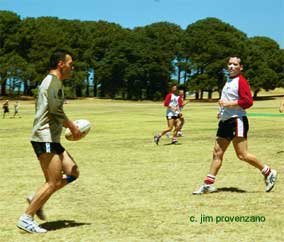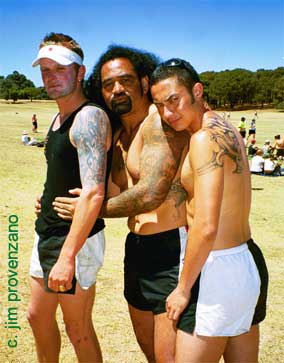Rugby Links
- Stade Francais
- Ian Roberts Fan Site
- IGRAB
International Gay Rugby Association and Board - Los Angeles Rebellion Rugby
- San Francisco Fog
- San Francisco Golden Gate Women's Rugby Club
The first rugby club in the western United States for lesbians and all women. They train Tue/Thurs at Glen Park (Elk & Bosworth) from 7-9pm. Email: cpeterson@hotmail.com- Washington Renegades Rugby Football Club
e-mail: eric@renegades-rugby.org
Division III club that aggressively recruits gay men and men of color from across the Washington, D.C., region- Belmont Shore Women's Rugby
e-mail: mmaxwell@mindarrow.com Women's rugby club; Site is currently down. Try email.- Boston Ironsides Rugby Football Club
e-mail: bostongayrugby@yahoogroups.com
Dedicated to bringing rugby to traditionally underrepresented men in the Boston area. Welcomes those interested in playing rugby, gay or otherwise, to join.- Gotham Rugby Football Club
e-mail: GothamRFC@yahoo.com- Houston Roughnecks Rugby
e-mail: info@roughnecksrugby.org- Indianapolis Womens Rugby Football Club
A HOYDEN is defined as a girl or women of saucy, boisterous, or carefree behavior.- Seattle Quake Rugby Football Club
e-mail: info@quakerugby.org- Kings Cross Steelers - Rugby Football Club
e-mail: chairman@kxsrfc.com
An integral part of the English rugby scene, the Steelers enjoy great support and encouragement at every level of the game.- Manchester Village Spartans RUFC
e-mail: simon@villagespartans.freeserve.co.uk
Men's Rugby Union team based in the Gay Village of Manchester, UK- Poofta
Proud Open Out Footballers Touch Assoc.
Sydney-based club of gay men, lesbians and their friends who play touch football.- Buenos Aires Rugby
e-mail: bsas-rugby@cybertech.com.ar
Es una asociación de hecho, sin fines de lucro y de carácter social, cultural y deportivo.- Emerald City Mudhens
e-mail: info@mudhenrugby.com- Spaceports - Auckland Gay Rugby Football Club
e-mail: zorb72@hotmail.com
Provides a social and fun environment for gay and bi men to participate in and support their own rugby team.- Sth. P.O.O.F.T.A.
e-mail: paulc@lonelyplanet.com.au
the Southern Chapter of the 'Proud Openly Out Football Touch Association'- SthPOOFTA
Website: http://www.midsumma.org.au/spoofta
e-mail: sthpoofta@hotmail.com
Melbourne's gay & lesbian touch rugby team
This gorgeous French team annually poses nude for a fundraiser calendar. Buy 'em, download "Making Of" videos, etc. Mon dieu! Les beaux mecs!
This hunky Aussie stud is the only pro rugby player to have come out, and while he competed. The site includes a comprehensive array of articles, photos and other links. Beauty, mate!
e-mail: raimundo.martinez@saic.com
The rugby organization for the world's gay rugby clubs.
e-mail: dino@rebellionrugby.org
Southern California rugby squad.
The first rugby club in the western United States established to invite members from traditionally under-represented groups
by Jim Provenzano
Bay Area Reporter
February 2003

|
Say "rugby," and the average gay man might think of Ian Roberts, the out gay former player, or perhaps the sexy French national rugby calendars. It's sexy, rowdy and its participants have a habit of celebrating with lots of beer and nudity.
While the sport of rugby appears to any outsider to be one of the most homosocial, if not homoerotic of macho athletics, the movement toward gay-inclusive teams is only five years old.
Gay rugby's roots go back to merry olde England, when in 1998 The Kings Cross Steelers made headlines in this paper, and elsewhere, from their first efforts, which were in a long time in reaching a victory. The primarily recreational-level team was regularly squashed by opponents, but stuck it out as other teams formed around the world. They now boast three teams.
In a 1998 Sports Illustrated article, Nicolas Revel was quoted as saying, "I think the main reason we are accepted is that we are not--how do you say it?--very camp." Revel, a speedy back from France, was one of the Steelers' two best early players in its early years. Their club colors are blue and green. "I wouldn't have played if they were pink," said coach Ian Samuel-Smith.
Pink colors did show up on the T-shirts of sideline cheerleaders drafted by Sydney locals from among the fans. My hot pink T-shirt is among the more unique of Games souvenirs.
Last year's Mark Bingham Cup, held at Golden Gate Park's Polo Fields, and sponsored by the San Francisco Fog, made headlines and got major corporate sponsorship for the newer of teams, and now one of the larger, in the US.
And although the San Francisco Fog did not compete as a team, due to the different style, as well as timing and expenses, about eight Bay Areans competed on various pick-up teams throughout the week.
LITTLE ORPHANS HANDY
Russ Myer from Oakland and Mike Farris from Seattle
were both on the World Orphans Team. They talked
before their third day of playing on the wide open
fields in Centennial Park.
With only one clinic the Sunday of Games week, the players got a quick primer in touch rules, which are different from rugby union rules.
"A lot of it, we already know, with ball handling and passing," said Farris. "It's just the different variations on what you do, where you touch. It follows the format of rugby League, which is like tackle, but in rugby union, when you're tackled, the ball is still in play. In league, you place the ball, and have other opportunities to run with the ball before the exchange is over. In rugby union, it's whoever can get the ball, so it's more aggressive."
Were they intimidated to play Australians more familiar with all aspects of the sport?
"Oh, they're a bunch of cute guys, and they're a lot of fun!"
For Myer, "The big difference is the mechanics are similar, but the strategies are different. Our days here have been kind of picking up the strategies as we go. Our goal is to improve each game, and I think we've been doing that. We're not really worried about winning."

Kolose Sifuiva (center) with other tattooed pals
|
Trying to win against a large and experienced opponent like Kolose Sifuiva of Auckland proved tough. The local Pooftahs and Blacks squads swept almost all medals.
Sifuiva has played league for South Auckland since he was a teen. He then changed to union five years ago when a gay rugby team was formed. "We were the only gay team in the social grade (rec. league). We play about fifteen games a year, per season."
His first Gay Games proved enjoyable for Sifuiva, who showed off his tattoos with fellow teammates. He and his teammates hope to visit Montreal in 2006, "If they have touch rugby, but I can also play volleyball, softball, just about any sport, really," he said.
As to hopes of adding the more active style of rugby top the events, Sifuiva hedged his bets. "You'd need a squad of 30 or so, because of injuries and stuff. We've got quite a few guys injured here already, but it's not too bad."
DRESSED TO KILT
James Hudson of New Zealand played with the Touch
Blacks, which he said is made up primarily of the
union rugby team in Auckland. "We all play touch
together in the summer, so we decided to take a team
down to Sydney," Hudson said.
He agreed that the sport afforded a home field advantage, particularly among the varying squads of self-named Pooftahs.
Despite their touch rugby advantage, the Aussies and Kiwis do hope to see rugby (tackle) union at a future Gay Games.
"There'd definitely be more teams comin' on, especially from the U.K. as well," said Robert Brown, an Auckland and Sydney athlete originally from Scotland.
Most Games teams, including the Auckland and New Zealand squads, were almost entirely gay men. "It would be more of a competition," said Brown.
What brought the Scot to Oz? "I was gonna be cheeky and say 'A plane,' but no, it was a work visa," said Brown, who also wrestles, but with few wrestling coaches or teams in New Zealand, gay or straight, he chose rugby for his Games sport.
He used to train with clubs in Glasgow, London and Sydney, and hopes to wrestle more in the future, "But for now, I just did rugby. I wanted to do something, even standin' around doin' Tiddly-winks!"
He plans to wrestle in Montreal for Gay Games VII, "with some o' me old mates."
While a bit of a globe traveler, Brown plans to encourage more Scottish pals to join up and grow more sports teams, adding to the celebratory multinational flair that make the Games so much fun.
"We're joinin' Team Scotland," he said, "So when we march in at op'nin' Ceremonies at the next Games, we'll have kilts and bagpipes, the whole deal, along with a lesbian drumming corps from Glasgow."